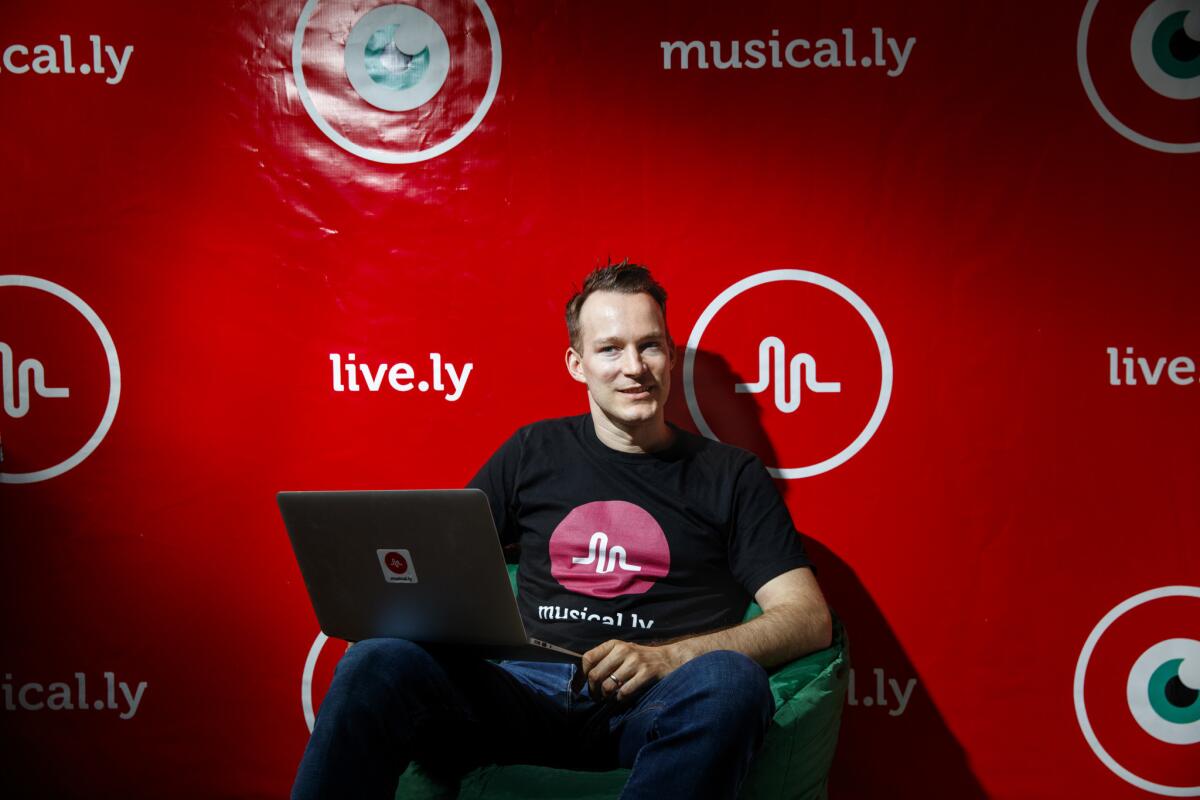Need Halloween decorations or camping gear? L.A. startup Joymode wants to be the Uber of that.
- Share via
Apps have helped people share their homes, cars and technical skills. But stuff — specifically, the kind that spends most of the year in garages, closets and sheds — hasn’t proved as easy to share.
Enter Joymode. Rather than own stuff you’ll seldom use, the start-up offers on-demand rentals. Planning a beach party? Joymode delivers a package of beach chairs, blankets and sand toys. Want to have a backyard movie night on a whim? Joymode serves up a projector, a popcorn machine and a fire pit.
After the outing or event is over, the company sends an employee to retrieve the stuff. It cuts down the clutter and, if all goes as planned, customers end up spending 1/10th the cost of buying the goods.
Out of a small warehouse in downtown Los Angeles, Joymode founder Joe Fernandez is using the region as a testbed for the concept. The goal is to get renters to pay a $99 subscription fee and then about $50 for each experience.
In the first six months, users on average have spent $183 to use $2,131 worth of products, according to the company.
“Proving it works in San Francisco wouldn’t give me confidence that it could work in Chicago or Dallas,” Fernandez said. “But Los Angeles really has a lot of different perspectives.”
Fernandez got the idea after living with his girlfriend in a small space in San Francisco, where he launched and sold a social media analytics company called Klout, which got buzz for scoring people’s social media popularity. In the growing number of apartments in downtown Los Angeles, he saw an opportunity to help people better utilize their limited space.
Users can borrow from Joymode without becoming members, but it will cost about $30 extra each time. Membership is meant to encourage people to feel like they are part of a community sharing collectively owned items, Fernandez said.
Ten companies, ranging from a few employees to dozens, have bought memberships for all their employees as a corporate perk, he added.
Joymode has about 50 experience packages available so far. Not all evoke the traditional definition of joy. The company loans out vacuums and cleaning products as well as air mattress and sheets. All returned items get scrubbed or machine-washed. Heavily used items likely will be donated.
The company could add additional revenue streams. There’s talk of Joymode-branded gear, which could bring down costs and provide free marketing. Advertisers could sponsor experiences to push their products. Other retailers could come in as partners to rent more seasonable items such as snowboards and skis. And Joymode could launch a marketplace for people to offer ancillary services, such as a dealer for the poker night experience or a surf instructor for the beach package.
Joymode doesn’t have a target date in mind to expand past Los Angeles. It’s only now close to hitting 100 reservations per weekend here, with busy areas including downtown, Silver Lake and Beverlywood.
Investors have bet $3 million on Joymode. Backers include Homebrew, Lowercase, Founders Collective, Collaborative Fund, TenOneTen, Slow and Sherpa.
Fernandez said getting investors on board was a complicated maneuver. Holding inventory has generally been frowned upon by venture capitalists, given the success Airbnb and Uber have had renting other people’s things and avoiding the increased logistics challenge.
“You’re taking on ownership. That’s a big idea. That’s ambitious,” Fernandez recalled investors telling him.
Then he would tell them, “We’re going to own inventory.” That’s when he could just imagine the sound of a car skidding off the road in their minds. But Fernandez said societal trends are in his favor and that Joymode should thrive on its own for decades.
Embodied gets Intel backing in quest to develop motivational robots

Paolo Pirjanian spent a decade developing floor-cleaning robots. But as much as people love their Roombas, he thinks people will love the robots he’s working on now much more.
Pirjanian announced Monday that he and business partner Maja Mataric, a robotics and neuroscience professor at USC, are piecing together automated assistants meant to help people with physical and psychological disabilities. The key though, he says, is that the robots will serve as coaches and motivators more so than laborers.
“Instead of robots that perform tasks on your behalf, we want robots motivating them to do tasks together,” Pirjanian said. “So [users] are active and independent, day to day, living in their homes.”
Pirjanian says that clear goal separates the robot he’s trying to make from the dozens of social robots popping up across the world that seem to have either no purpose or too many purposes.
His Emobodied Inc. has received $4.2 million in seed funding, mostly from Intel Corp.’s investment arm. Other backers of the Pasadena start-up include Amazon.com Inc.’s Alexa fund, Osage University Partners, Grishin and Hive.
Intel’s RealSense 3-D camera technology and Amazon’s Alexa voice assistant might be used in the robot along with off-the-shelf technology from other vendors. Such new systems have brought down the costs of developing self-driving cars, virtual assistants and other robots, but integrating them all together is the complex challenge any manufacturer faces.
“Intel Capital looks to invest in companies with visionary entrepreneurs developing breakthrough technology that has potential to transform lives,” Ameet Bhansali, managing director of Intel Capital’s new technologies sector, said in a statement. “Embodied certainly fits with that goal.”

Pirjanian and Mataric have known each for 17 years, since he conducted research at her lab. He went on to start Evolution Robotics, which devised a navigation system for robots and a cleaning tool known as Mint. Evolution reportedly sold for $74 million to Roomba maker iRobot in 2012.
He spent three years as chief technology officer at iRobot, but left last year after feeling his desire to create something more powerful was stifled in the large organization.
Embodied plans to have a product in widespread testing in a year. It won’t look like any robot on the market today, but the aim is to deliver a “life-like character that can see, interact and understand your emotions,” Pirjanian said. The first version shouldn’t require regulatory approval prior to sale, though later models may.
He’s still thinking through how to make money and declined to say whether his eventual goal is to replace home health aides, nurses and the like.
“The way we’re thinking about it is an enhancement of care delivered at your home at your convenience,” Pirjanian said. “It can make care and wellness affordable and accessible to a lot more people.”
Hot social app Musical.ly opens Santa Monica office

The Chinese social media app that has taken American schools by storm has opened a 15-person business development office in Santa Monica.
Musical.ly said the recent move of its U.S. headquarters to Southern California from San Francisco is paying dividends. In the last few weeks, employees working on deals with top users, advertisers and other partners have been able to move much faster, said Alex Hofmann, who runs the company’s U.S. operations.
“We share the same Starbucks with Universal Music,” he said. “Every time we go for a coffee, we’re seeing someone.”
But it’s not as if Musical.ly employees need an excuse to get people to meet with them.
Musical.ly launched more than two years ago as a lip-syncing app where people could record goofy videos of themselves trying to sing along to popular songs. Since then, it has become a digital video hub used by about 50 million people each month — placing it among the fastest-growing apps. There’s real singing, dancing, comedy and general nonsense from people’s daily lives.
In the coming weeks, the Shanghai start-up plans to release new chat features in hopes of better competing with Snapchat and Facebook.
What those two companies seem to have that Musical.ly doesn't yet is a business model. Hofmann said the start-up is experimenting with a number of options, including following other social media apps into advertising. In just the last week, the company has met with Applebee’s and Paramount Pictures to discuss possibilities.
“We’re in the ‘just getting the car out of the garage’ stage,” Hofmann said.

Musical.ly must keep adding users and getting them to stay on the app for longer to get advertisers to stick around. It’s a goal also sought after by Flipagram, a Los Angeles video app company that had about 36 million monthly users earlier this year.
Musical.ly users are mostly girls, but Hofmann said more boys and more young adults are joining the app.
Live.ly, the company’s other app, has amassed about 5 million users since coming out in July. Live streamers can make money on the app by showing off their talents and collecting virtual gifts (that cost real money) from viewers. The company takes a cut of purchases.
The new office has room for about 50 people. But no plans are in place to hire for technical positions in Santa Monica, Hofmann said.
Elsewhere on the Web
Dating app Tinder is opening a 20-person technology office in Palo Alto in hopes of having better luck recruiting veterans of Google, Facebook and other large companies, according to Recode.
Fitness regimen app Handstand has received about $1 million from investors, including start-up studio Science Inc. and athletics gear maker Reebok, according to finsmes.com.
Mobile game maker Seriously has released the second game in its “Best Fiends” trilogy, according to L.A. Biz.
Talent agency WME’s head of digital has left to work on Overtime, a sports video highlights app that he helped create, according to the Hollywood Reporter.
Ahead of big news events such as the East Coast’s recent hurricane, Matthew, Snapchat encourages organizations, officials and companies associated with the incident to post on the app, with the hope of curating the best clips into videos it promotes to users, according to Mashable.
Comcast Ventures announced it has hired Dinesh Moorjani as a managing director based in Santa Monica.
In case you missed it
Don't think of Amazon Echo as just a speaker. It's a whole new way of life.
At its U.S. launch, LeEco planned to show off two new cars. Only one arrived intact.
The nation's biggest banks, including JPMorgan Chase & Co., Wells Fargo & Co., and Bank of America Corp., are rolling out a new money-transfer app called Zelle to take on Venmo.
Coming up
Cornerstone OnDemand hosts its annual L.A. Tech Summit on Tuesday at the Fairmont Miramar Hotel in Santa Monica, with headliners such as George Boutros, CEO of investment bank Qatalyst Partners, and Chris Davis, CEO of entertainment goods seller Lootcrate.
Riot Games holds the World Championship for its “League of Legends” computer game at Staples Center on Saturday. South Korea’s SK Telecom T1, in its third championship berth in four years, will battle a powerful newcomer, South Korea’s Samsung Galaxy. Thousands of people are expected, with tickets that originally cost about $35 listed for four times that on re-sell apps.
Twitter: @peard33




